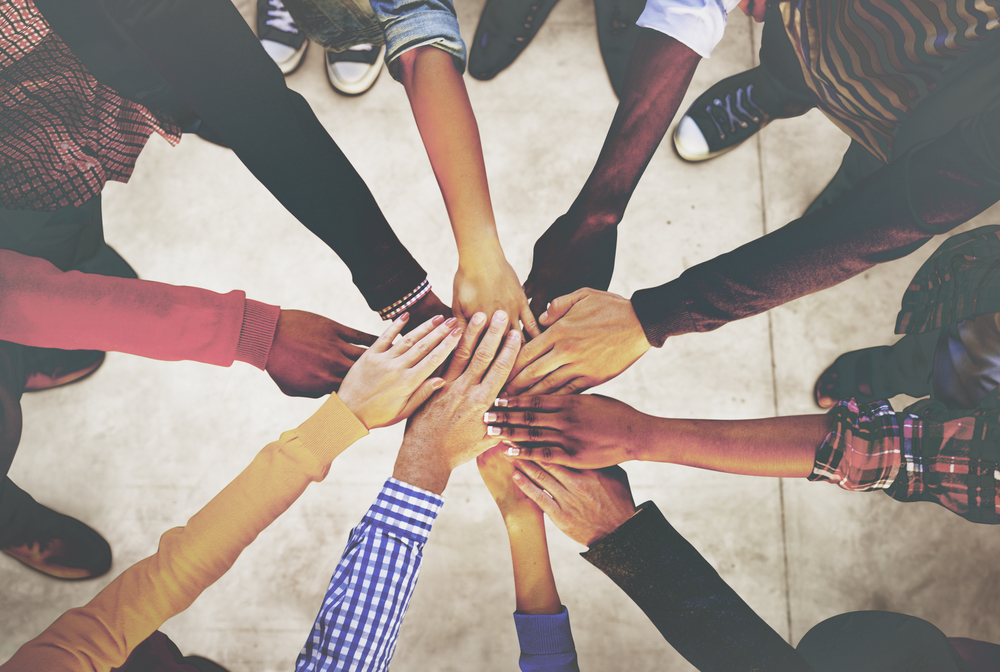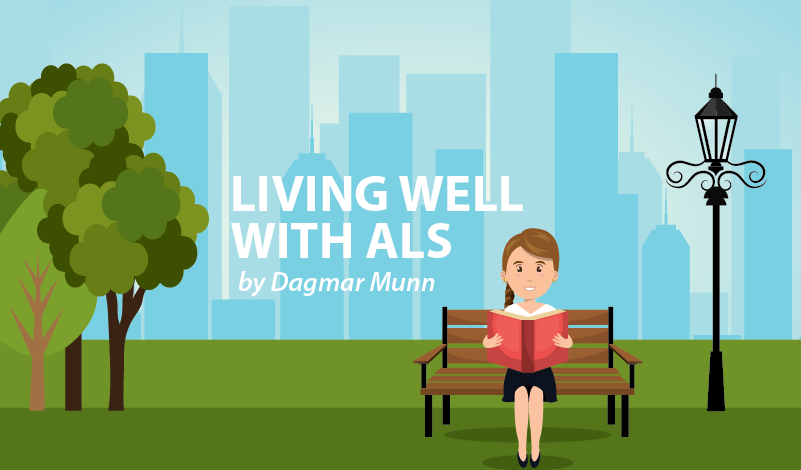How to Help Your Friends When They Ask to Help You

ALS is not only a confusing disease for those of us who have it, but it also throws our well-meaning friends into a tizzy. Friends who truly want to show their love and support are stymied as to what to do, how to act or what to bring.
That’s because we’ve been guided by our past experiences with other, more common, ailments. For example, when a friend is home sick with a cold, we bring soup. Or for someone recovering from surgery, we send cards and flowers. If they are in hospice care, then we know it’s time to say our goodbyes.
But announce to the world that you have ALS and most folks are completely baffled about what is expected of them. Heck, at the time, I didn’t even know how to answer their question, “What can I do to help?”
I remember those first few months. I received cards, flowers and, yes, even offers of soup! Don’t get me wrong; all of that certainly was welcome, and the soup was very tasty!
What is the answer?
Over the past few years, there have been studies looking at what contributes to quality of life for ALS patients, as well as what diminishes it. These studies found that feeling hopeful and having positive coping strategies improves overall well-being. What reduced quality of life? Feeling isolated, having little social interaction with others and losing the sense of meaning for one’s life.
If I could go back in time, here’s what I would tell my friends when they asked that famous question, “What can I do to help?”
- Encourage me to keep participating, interacting and socializing with normal activities. Offer to pick me up, walk in with me and sit next to me. Provide the moral support I need at this vulnerable time.
- Brainstorm with me for ways I can remain active in our group of friends while accommodating the changes in my physical abilities and my energy level.
- If I begin to avoid going out or am home-bound, keep me in the loop through emails filled with photos or videos. Keep in contact via FaceTime, Skype or other video-chat channels.
- Try to keep our relationship as normal as possible. Pull me out of dwelling on my illness by sharing funny stories or discussing our common interests and current events.
- I may walk a little slower now, have speech issues, and not eat the same foods as before, but don’t let that prevent me from attending special events and enjoying the company of others.
- And, finally, keep my caregiver (spouse) in mind. If my care is intensifying, offer to run errands, mail a package or pick up a take-out meal. Or maybe give the gift of time by offering to visit with me so he or she can get out and have some “me time” as well.
But all this help is a two-way street, so I promise to:
- Be open to your invitations. I may not feel emotionally up to it initially, but I’ll go along anyway. I know that showing up and being among friends is the best thing to lift my mood and outlook.
- Let you know when I need help and I will accept it when offered.
- Be honest with you about my energy levels. I will discuss it openly and let you know when I need calm and rest, or when I’m able to join in and have fun together.
Let’s be the change. Let’s raise awareness of ALS. Let’s help friends and family learn what they can do to help maintain the quality of our lives.
Because, we CAN thrive with a little help from our friends!
***
Note: ALS News Today is strictly a news and information website about the disease. It does not provide medical advice, diagnosis, or treatment. This content is not intended to be a substitute for professional medical advice, diagnosis, or treatment. Always seek the advice of your physician or other qualified health provider with any questions you may have regarding a medical condition. Never disregard professional medical advice or delay in seeking it because of something you have read on this website. The opinions expressed in this column are not those of ALS News Today, or its parent company, Bionews Services, and are intended to spark discussion about issues pertaining to ALS.








Sylvia Hall
When I learned that my husbands youngest sister had ALS I was devastated. We live thousands of miles away and we didn't know how well she was really doing. She solved that by flying out to see us and it was a wonderful visit and we learned that she was still the same sweet fun-loving girl we had known before. Thanks to her husband, even though both she and my husband were both handicapped we had a wonderful time together. Because she didn't let the disease define her as a person she has made life better for all those around her. Thanks to the support she has received from the ALS community as a whole.
Fran Finney
Very straightforward and useful article. When a person is first diagnosed with ALS, no one really know how the progression will go. Sometimes hte changes are very gradual, other times no so much. My husband had a very aggressive form of ALS. Before his first year post diagnosis was over, he could no longer speak or type, was in a power chair and had a feeding tube. But social isolation was the worst thing. Interaction with friends and family was very invaluable for him, and really helped keep his spirits up..
KG
Great advice! As someone living with ALS, I too never know what to tell others as to how to help
Helen
Thank you, very useful and inspiring information. Much appreciated :)
David Kenneth Kimball
I was just diagnosed with ALS last fall. I was very devastated. I had always been outgoing, a little silly, extremely physically strong, hard worker. I felt like I had it all. Then one day even my personality changed. I would cry or laugh over nothing. Many (friends) started judging me. They said I was just feeling sorry for myself, or having a pity party, they would tell me that they had to walk on eggshells around me. When I was well, I was loyal to my friends, and always help them out, In many ways, money, time, or chores, anything I could do! Now I want just a phone call, but nothing now. What the ---- is wrong with people? They were not my friends at all. I was used, never asking anything in return. ENTITLEMENT
Dagmar Munn
David, I am sorry you are facing the onset of ALS alone, without the support of your friends. It sounds like they don't understand what ALS is, and how ALS symptoms can "change" the person that they once knew.
Since you were diagnosed only last fall, ALS is still new to you too. It takes time to adjust and adapt to new ways of moving - - and not moving. Give yourself a little mental space. Perhaps there is just one friend (or family member) who can be your emotional support person during this time? Someone who you can trust to hear your fears, anger or frustration - - and not react negatively, but just listen. When you finally feel comfortable with your body's symptoms and feelings... then slowly invite one or more friends into your "circle." I also suggest confiding in your ALS Association Care Coordinator, who can offer more suggestions. You are not alone feeling this way. We've all experienced it. The key is having the will to find yourself again and be comfortable living with ALS.
Kaleigh Anderson
David - I was so saddened to read your comment... on top of all you're facing and processing, you feel abandoned by friends. That's a horrible feeling! :( A friend of mine was just diagnosed with ALS - and I find myself, to my shock, avoiding talking to her! I'm so scared I'll say the wrong thing. So here I am - googling what to and not to say to someone with ALS. Does she want me to avoid the ALS topic and have some normalcy? Or does she really need to bend an ear and just "vent" or share what she's feeling - and needs to talk about her diagnosis? I'm so lost with all this! For the first time in our once very chatty friendship, I don't know what to say. I'm guessing your friends aren't sure how to help either. Have you thought about hosting a get together (hard to do during COVID, I know) - and telling your friends face to face how much you need them & their support right now? Let them ask you questions about ALS and ask you flat how what they can do that would be most helpful. Helping them feel comfortable interacting with you by telling them exactly what you need might be the way to get your friendships back on track. I was just learning that with ALS, random moments of laughing or weeping can happen... I had no idea... knowing this is so very helpful. I have so much to learn - and I know it will help my friend if I learn as much as I can about ALS. Lastly, I'm scared - I'm scared for my friend, I'm scared for her children and her family, and I'm scared for me -- I'm scared I'll let her down or not give the kind of support she most needs. Your friends may be scared, too. Reach out to your closest friends and tell them you need them. Wishing you the best!
Pat Gonder
As a stroke survivor your comments and suggestions help and encourage me. Thanks for your sage advice and skill at mentoring others. So grateful for you! Pat
Dagmar Munn
Pat, I'm delighted to know that what I write is helpful to you. Dagmar